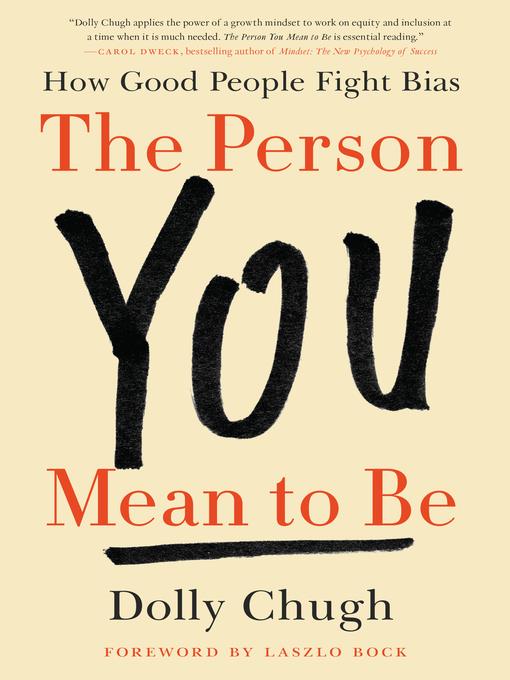
The Person You Mean to Be
How Good People Fight Bias
کتاب های مرتبط
- اطلاعات
- نقد و بررسی
- دیدگاه کاربران
نقد و بررسی

July 1, 2018
A guide to social change through personal transformation, this first book by Harvard social psychologist Chugh aims to provide the knowledge and tools needed to confront both individual and systemic biases that create and perpetuate inequity. Mixing social science research, stories of acquaintances' experiences and breakthroughs, and explicit advice, Chugh discusses developing a growth mind-set, recognizing and leveraging "ordinary privilege" (identities such as whiteness, straightness, physical ability, and financial stability that are normative in the dominant culture), becoming aware of power imbalances and their roots, and moving from "believer" to "builder" through active engagement with people and systems. Chugh's warm tone, foregrounded humility, and encouraging style facilitate but don't minimize the work. Her frequent use of binaries clarifies complicated concepts: strategies of heat (confrontation) and light (dialog); societal factors that serve as headwinds (disadvantages) and tailwinds (advantages); and centrally, the transformation from believer (passive and perhaps unwoke) to builder (active and self-aware), which is a journey rather than an event. VERDICT A timely, high-level book that will benefit and appeal to those who want to use their privilege to work toward equity and justice.--Janet Ingraham Dwyer, State Lib. of Ohio, Columbus
Copyright 2018 Library Journal, LLC Used with permission.

July 30, 2018
Chugh, an associate professor at the NYU Stern School of Business, offers practical advice on being aware of bias, diversity, oppression, and privilege, and on acting intentionally on that awareness in everyday life, in this helpful guidebook. The author advances thoughtfully through four major themes: “activating the growth mindset,” “seeing the ordinary privilege,” “opting for willful awareness,” and “engaging the people and systems around us.” Humility is the touchstone of Chugh’s approach. She is not afraid to illustrate lessons with her own missteps, as when she met a transgender activist who “did all the work to make me less ignorant, when that should have been my job.” Similarly, she recounts her indignant reaction to an offensive joke made at a wedding dinner by another guest as an example of what not to do. Elsewhere, she mines the latest in social scientific research for practical suggestions. After reporting one study in which “researchers found that almost none of the white mothers discussed race with their children (ages 4-5),” she dispenses advice to parents on how to point out imbalances in representation to their children. In addition to providing a road map for individuals, this book would serve as an excellent training tool for institutional diversity programs, whether to enlighten new supervisors or to accompany diversity workshops.

August 1, 2018
Chugh, author and award-winning social psychologist at the New York University Stern School of Business, takes readers on a journey of self-discovery in bias awareness, targeting open-minded readers who understand that bias exists and are willing to take steps to address it. From Chugh's extensive research come stories that illustrate common bias situations, and she provides analysis to help understand the scenario from other viewpoints. She then encourages "believers" to become "builders" by activating a growth mindset, seeing ordinary privilege, and being aware of and engaging others. During this process, she suggests that people strive not to be good but to be good-ish and continuing to grow. Readers examine their ordinary privilege ?the part of identity that one takes for granted, such as gender, race, and education level. Chugh encourages self-reflection to recognize blind spots in thinking patterns, identifies tools for influencing change, and details how to take this new skillset to the next level while engaging with others at home, work, and other areas of life. This book will be of interest to students, sociologists, and those in the workforce.(Reprinted with permission of Booklist, copyright 2018, American Library Association.)

























دیدگاه کاربران